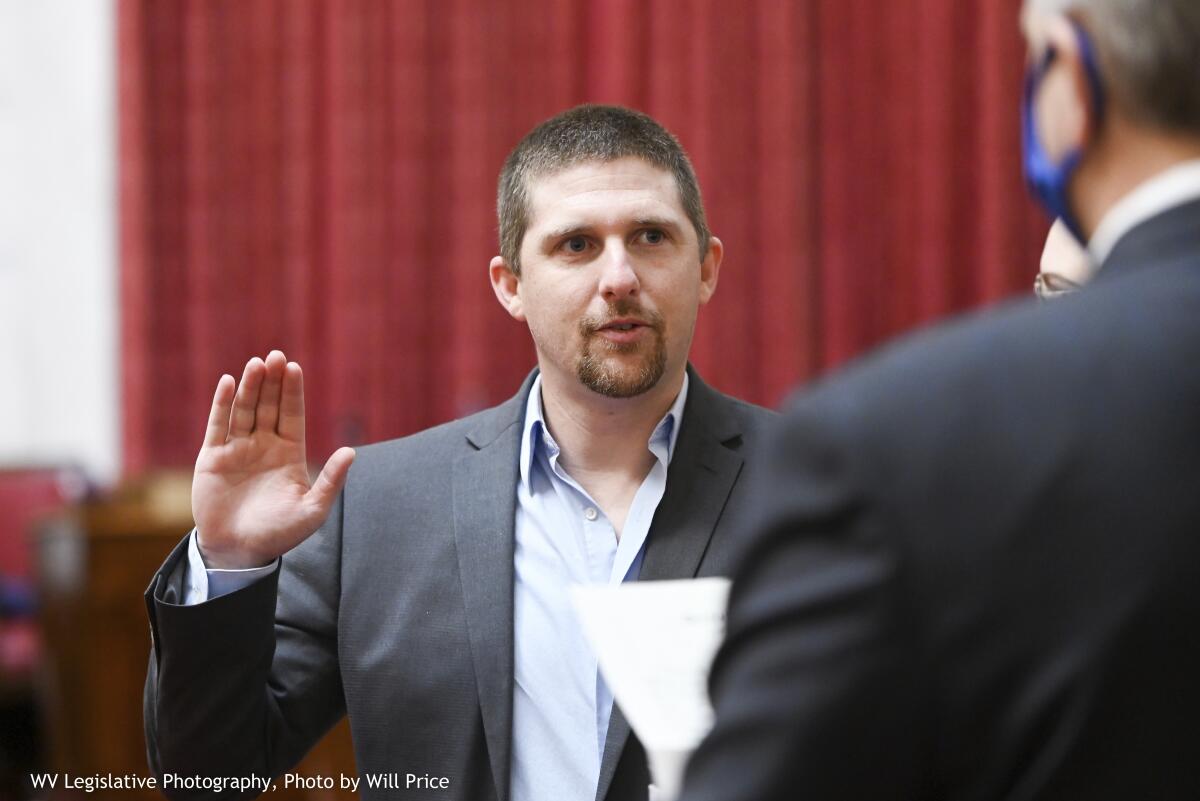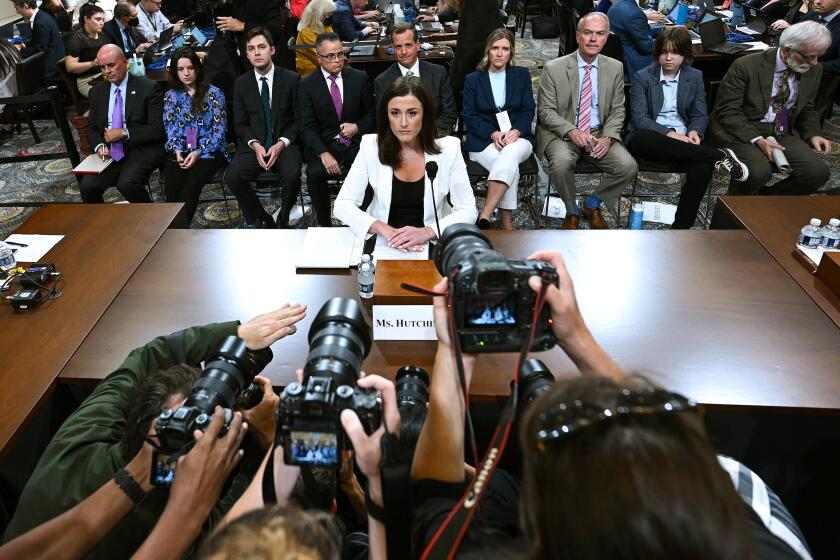Some Jan. 6 rioters apologize in court, then change their tune later

WASHINGTON — Appearing before a federal judge after pleading guilty to a felony charge in the deadly U.S. Capitol riot, former West Virginia lawmaker Derrick Evans expressed remorse for letting down his family and his community, saying he had made a “crucial mistake.”
Less than a year later, Evans is now portraying himself as a victim of a politically motivated prosecution as he runs to serve in the same building he stormed Jan. 6, 2021. Evans is now calling the Justice Department’s Jan. 6 prosecutions a “miscarriage of justice” and describes himself on Twitter as a “J6 Patriot.”
“Some ppl have said I need to apologize and condemn #J6 if I want to win my election as the media will attack me,” he tweeted recently after announcing his bid for a U.S. House seat in 2024. “I will not compromise my values or beliefs. That’s what politicians do. We need Patriots not politicians.”
Evans joins a series of Jan. 6 defendants who, when up against possible prison time in court, have expressed regret for joining the pro-Trump mob, only to strike a different tone or downplay the riot after receiving their punishment.
The very first Jan. 6 defendant to be sentenced apologized in court went on Fox News shortly afterward and seemed to minimize the riot. Another defendant who called Jan. 6 “horrifying and disgusting” later donned an orange jumpsuit to play the part of a distraught prisoner in a bizarre tribute to imprisoned Capitol rioters during a conference of conservatives.
Some defendants have drawn ire from judges or the Justice Department for their inconsistent comments. But there’s not much the legal system can do for an adjudicated defendant. And because some conservatives hold up Jan. 6 defendants as martyrs, there’s a political and possibly financial incentive for them to change their tune.
Seditious conspiracy trial of Proud Boys leader Enrique Tarrio and four lieutenants comes at a pivotal time in the prosecution of defendants in the Jan. 6, 2021, insurrection.
It could push judges to impose stronger punishments for rioters who haven’t yet made it to the end of their criminal cases. Even before Evans’ sentencing, the judge who heard his case began questioning the sincerity of rioters’ apologies after he felt duped by another defendant.
Before he was sentenced in June to three months in jail for civil disorder, Evans said he regretted his actions every day and told Senior Judge Royce Lamberth that he was a “good person who unfortunately was caught up in a moment.”
Shortly thereafter, prosecutors wrote to the judge about several statements Evans made on a radio show that were “inconsistent with the contrition” he showed at sentencing.
When asked whether he regretted his actions, Evans said on the show that he regretted the “situation” he was in. But he said he was “never going to have regrets when it comes to standing up and doing what’s right.”
Evans said in an emailed statement to the Associated Press that he still stands behind what he said in court.
A California doctor, who is a leading figure in the antivaccine movement, has been sentenced to 60 days in prison for storming the U.S. Capitol.
“That was my message to the judge. This is my message to the media. It’s time to tell the real story of what happened personally to me that day,” he said.
Evans said he lost “almost everything,” including his job as a state legislator and time with his kids, because of his decision Jan. 6, 2021. “How could I not regret that?” he asked. But he said he was “done being portrayed as a villain,” noting that he didn’t overrun any police officers and was inside the Capitol for only 10 minutes.
When determining an appropriate sentence, judges generally take into account whether defendants have taken responsibility for their actions and appear genuinely sorry. In some Jan. 6 cases, judges have faulted defendants for not appearing to show true remorse.
A lawyer for Treniss Evans III, who took a swig of whiskey in a congressional conference room during the riot, told the judge in court papers that Evans was “sincerely remorseful, and duly contrite.” But after Evans suggested at his November sentencing that Jan. 6 defendants were being treated unfairly — even though he said he condemned what happened — the judge said she didn’t believe he showed “full and genuine remorse.”
Videos provide a chilling new look at the chaos at the Capitol on Jan. 6, including footage of a man charging at a police officer with a flagpole
Months after he was ordered to serve 20 days in jail, the Texas man traveled to South Dakota to urge state lawmakers to support a resolution encouraging “the humane and fair treatment” of Jan. 6 defendants. The resolution failed by unanimous vote.
The first Jan. 6 defendant to get her punishment, Anna Morgan-Lloyd, told Lamberth that she was ashamed of the “savage display of violence” at the Capitol before he sentenced her to probation.
Shortly after, however, the Indiana woman told Fox News host Laura Ingraham that people were “very polite” during the riot and that she saw “relaxed” police officers chatting with rioters.
Lamberth apparently hasn’t forgotten about it. The judge wrote in court papers that he hoped another defendant’s “change of heart” was sincere because his hopes were “dashed” in her case. In another case, he wrote that he “often finds it difficult to ascertain the sincerity” of Jan. 6 defendants’ remorse.
“Many defendants appear sincere at sentencing, boasting of their purportedly deep shame, regret, and desire to change and be law-abiding citizens,” Lamberth wrote. “But this Court is all too familiar with crocodile tears.”
Breaking News
Get breaking news, investigations, analysis and more signature journalism from the Los Angeles Times in your inbox.
You may occasionally receive promotional content from the Los Angeles Times.
Morgan-Lloyd’s attorney has said that she believes her client was remorseful, was “played” by Ingraham and sent the judge a letter after her TV interview. When contacted by the Associated Press, Morgan-Lloyd’s attorney said her client would not comment.
After he dodged prison time in his Jan. 6 case, right-wing activist Brandon Straka donned an orange jumpsuit and red MAGA cap and sat in a fake jail cell weeping histrionically for a procession of attendees at the Conservative Political Action Conference in Dallas in August. Rep. Marjorie Taylor Greene (R-Ga.) entered the cage and embraced Straka before they appeared to pray together.
Months earlier, with a possible jail term hanging over his head, Straka referred to Jan. 6 as “nothing more than an incredibly shameful day that had absolutely no positive attributes whatsoever.”
“I’m sorry that I was present in any way at an event that led people to feel afraid, that caused shame and embarrassment on our country, and that served absolutely no purpose other than to further tear away at the already heartbreaking divide in this country,” he wrote in a letter to U.S. District Judge Dabney Friedrich, who sentenced him to 36 months of probation.
Ex-White House aide Cassidy Hutchinson says she told her mother that Trump’s inner circle “will ruin my life ... if I do anything that they don’t want me to do.”
An email seeking comment was sent to Straka, who is from Nebraska. He has said that the CPAC performance was meant “to provoke a reaction about political division, human rights abuses & more” and accused critics of trying to “criminalize art.”
Since the sentencing, the judge questioned whether Straka wanted to withdraw his guilty plea and said he could be opening himself up to prosecution for making false statements because of public comments she said seemed to contradict things he said in court.
A written statement of offense that Straka agreed was correct under his plea deal says that he yelled, “Take it! Take it!” while filming others trying to rip a police officer’s shield from his hands. Straka later told Fox News host Tucker Carlson that he told his lawyer that he never made that comment. He suggested that he admitted doing so because he was under pressure to take a deal.
More to Read
Get the L.A. Times Politics newsletter
Deeply reported insights into legislation, politics and policy from Sacramento, Washington and beyond. In your inbox three times per week.
You may occasionally receive promotional content from the Los Angeles Times.














